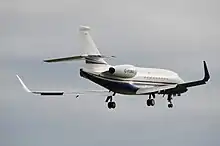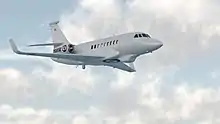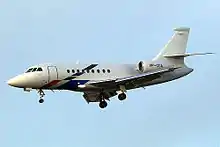Dassault Falcon 2000
The Dassault Falcon 2000 is a business jet produced by French Dassault Aviation, a member of its Falcon business jet line. Developed from the Falcon 900 trijet, the smaller twinjet has less range.
| Falcon 2000 | |
|---|---|
.jpg.webp) | |
| Role | Business jet |
| National origin | France |
| Manufacturer | Dassault Aviation |
| First flight | 4 March 1993 |
| Status | Active in production |
| Produced | 1995–present[1] |
| Number built | 675 (Oct 2022)[2] |
| Developed from | Dassault Falcon 900 |
Development

The Falcon 900 fuselage was shortened by 7 ft (2.1 m) to carry up to 10 passengers. The wing leading edge was modified and its inboard slats were removed.[2] It was introduced in 1995 for $17.85 million,[2] while the 2023 Falcon 2000LXS lists for $36 million.[3]
Variants
- Falcon 2000
- Original version certified in 1994[4] with CFE (General Electric & AlliedSignal) CFE738-1-1B turbofans,[5][6] with 5,918 lbf (26.32 kN) of thrust each, a 2,841 nmi (5,262 km) range and Collins Pro Line 4 avionics suite.[2]
- Falcon 2000EX
- Re-engined variant certified in 2003 with Pratt & Whitney Canada PW308C turbofan engines,[5] 7,000 lbf (31 kN) each, offering a 3,878 nmi (7,182 km) range.[2]
- Falcon 2000EX EASy
- Marketing designation for a 2000EX with changes to pressurisation and oxygen systems, certified in 2004,[4] and Honeywell Primus Epic-based EASy avionics suite, including synthetic vision.[2] Undertook steep approach trials at London City Airport on 18 March 2010, becoming the first Dassault twin-jet to visit apart from the much older, diminutive Dassault Falcon 10.
- Falcon 2000DX
- Updated model certified in 2007[4] and based on the 2000EX EASy with the same PW308C turbofans.[7] Shorter-range of 3,250 nmi (6,020 km) for $28.5 million.[2]
- Falcon 2000LX

- Longer-range 2009[4] variant of the Falcon 2000EX EASy, with the addition of Aviation Partners Blended Winglets, giving it a range capability of 4,000 nautical miles (7,400 km).[8] The same winglets are certified for the entire Falcon 2000 series as a retrofit kit.
- Falcon 2000S
- Variant which began testing in 2011 with short field characteristics.[9] Landing distance has been reduced to 705 meters, opening up 50% more airports than other aircraft in this class.[10] Compared to the $5 million more expensive LXS, the S range is shorter by 500 mi (800 km; 430 nmi) by restricting its fuel capacity to 14,600 lb (6,600 kg).[11] It burns 2,350–2,400 lb (1,070–1,090 kg) of fuel in the first hour and 1,600–1,650 lb (730–750 kg) afterwards, and can take off in 4,325 ft (1,318 m) at sea level on a standard day.[11] In 2021, its equipped price was $28.8M.[12] It offers a 3,350 nmi (6,200 km) range.[2]
- Falcon 2000LXS
- Replacement for the long-range 2000LX and introduced in 2014. Relative to its predecessor, the Falcon 2000LXS offers greatly improved takeoff and landing performance, superior cabin comfort and reduced emissions. It also has a lower approach speed (194 km/h vs. 210 km/h), enabling it to land in a shorter distance, 689 m vs. 800 m, equivalent to turboprop aircraft.[13][14] In 2021, its equipped price was $35.1M.[12]
- Falcon 2000MRA/MSA
- The Maritime Reconnaissance Aircraft (MRA) or Maritime surveillance aircraft (MSA) is a militarized variant based on the Falcon 2000LXS. Six Falcon 2000MSA were ordered by the Japan Coast Guard in 2015, with delivery expected from 2019 onwards.[15][16]
- Falcon 2000 Albatros

Derived from the Falcon 2000MRA, the Falcon 2000 Albatros was selected in 2020 to replace the French Naval Aviation's Falcon 50 Surmar and Falcon 200 Gardian aircraft. The aircraft is designed for maritime surveillance and intervention missions. It will incorporate a multifunction under-fuselage radar, a high-performance optronic ball, observation windows, a Search & Rescue chain release system and dedicated communications systems. Seven units have been ordered and are to be delivered from 2025 onwards, with the acquisition of five additional units planned for a total of twelve aircraft.[17]
Operators


_%D0%BF%D0%BE%D1%81%D0%B0%D0%B4%D0%BA%D0%B0_%D0%B2_%D0%B0%D1%8D%D1%80%D0%BE%D0%BF%D0%BE%D1%80%D1%82%D1%83_%D0%A3%D1%81%D1%82%D1%8C-%D0%9A%D1%83%D1%82.JPG.webp)
Civil operators
The aircraft is operated by private individuals, companies and executive charter operators. A number of companies also use the aircraft as part of fractional ownership programs.
Military and government operators
- Japan Coast Guard: Six Falcon 2000 MSA ordered.[15]
- Republic of Korea Air Force: 2 ELINT Falcon 2000s on order.[19]
- French Air and Space Force: 1 Falcon 2000EX and 1 Falcon 2000LX in service. The two aircraft are part of the French presidential fleet.
- French Navy: 7 Falcon 2000 Albatros on order; 5 additional units planned.
Specifications (Falcon 2000LXS)
.jpg.webp)
Data from Dassault[20]
General characteristics
- Crew: 2
- Capacity: 10 passengers
- Length: 20.23 m (66 ft 4 in)
- Wingspan: 21.38 m (70 ft 2 in)
- Height: 7.11 m (23 ft 4 in)
- Max takeoff weight: 19,414 kg (42,801 lb)
- Fuel capacity: 16,660 lb (7,557 kg)
- Powerplant: 2 × Pratt & Whitney Canada PW308C turbofan engines, 31.14 kN (7,000 lbf) thrust each
Performance
- Maximum speed: Mach 0.85-0.862
- Range: 7,408 km (4,603 mi, 4,000 nmi) (6 passengers, 2 crew, Mach .80)
- Service ceiling: 14,326 m (47,001 ft)
- Take-off distance: 1,425 m (4,675 ft)
- Landing distance: 689 m (2,260 ft) ((FAR 91, 6 pax, SL, NBAA IFR reserves)
See also
Related development
Aircraft of comparable role, configuration, and era
- Bombardier Challenger 605
- Bombardier Challenger 350
- Cessna Citation Longitude
- Embraer Legacy 450/500 and Praetor 500/600
- Embraer Legacy 600
- Gulfstream G450
References
- Murdo Morrison (12 October 2018). "NBAA: Business jet designs that changed the industry". FlightGlobal. Archived from the original on 13 October 2018. Retrieved 12 October 2018.
- Bill Carey (27 October 2022). "The Continuously Improved Falcon 2000". Business & Commercial Aviation.
- "Purchase planning handbook - Jets table". Business & Commercial Aircraft. Second Quarter 2023.
- "Type Certificate Data Sheet F2000, F2000EX" (PDF). European Aviation Safety Agency. Archived from the original (PDF) on 29 May 2010. Retrieved 18 September 2009.
- "Airliners.net description of the Falcon 2000". Archived from the original on 25 May 2011. Retrieved 23 November 2008.
- Jackson, Paul, ed. (2000). Jane's All the World's Aircraft 2000–01 (91st ed.). Coulsdon, Surrey, United Kingdom: Jane's Information Group. pp. 130–131. ISBN 978-0710620118.
- "Dassault Falcon 2000DX specifications". Archived from the original on 4 July 2008. Retrieved 20 June 2008.
- "Dassault Falcon 2000LX specifications". Archived from the original on 2 December 2008. Retrieved 23 November 2008.
- "Dassault presents the Falcon 2000S business jet for the first time in the Middle East". Archived from the original on 3 November 2013. Retrieved 11 December 2012.
- "Dassault's Falcon 2000S Beats Performance Targets."
- Fred George (24 May 2017). "Used Aircraft Report: Dassault Falcon 2000S". Aviation Week Network.
- "Purchase planning handbook - Jets table". Business & Commercial Aircraft. Second Quarter 2021.
- "Falcon Combines 2000S With 2000LX For New LXS". Archived from the original on 4 November 2013. Retrieved 3 June 2019.
- "Dassault Introduces the Falcon 2000LXS."
- Grolleau 2021, p. 53
- "Japan Coast Guard Selects Dassault Aviation's Falcon 2000 Maritime Surveillance Aircraft". 22 April 2015. Archived from the original on 23 July 2015. Retrieved 22 April 2015.
- Dassault présente un nouvel appareil pour remplacer les Falcon 50 et Guardian Archived 17 August 2010 at the Wayback Machine and Maquettes du Falcon 2000 MRA au salon IDEX 2009 Archived 27 September 2011 at the Wayback Machine
- "152.Leesk". Archived from the original on 9 July 2017. Retrieved 2 June 2017.
- Anderson, Guy. "South Korea boosts ISR capabilities with Dassault Falcons" Archived 26 January 2012 at the Wayback Machine. IHS Jane's. 29 December 2011. Retrieved 1 January 2012.
- "Dassault Falcon 2000LXS backgrounder" (PDF). Dassault Aviation. June 2020.
- Grolleau, Henri-Pierre (May 2021). "Future French Falcons". Air International. Vol. 100, no. 5. pp. 52–57. ISSN 0306-5634.
External links
- Falcon 2000S Official Page
- "Dassault Falcon 2000LX" (PDF). Business & Commercial Aviation. September 2009. Archived from the original (PDF) on 13 July 2016.
- "Class Warfare: Falcon 2000S" (PDF). Business & Commercial Aviation. July 2011. Archived from the original (PDF) on 8 January 2017. Retrieved 29 July 2016.
- "Dassault Falcon 2000LX" (PDF). Business & Commercial Aviation. March 2012.